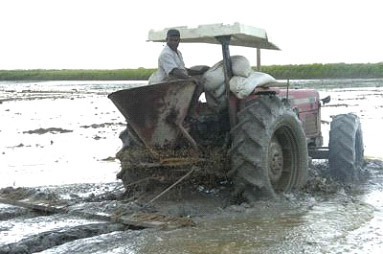(Trinidad Express) Agriculture Minister Clarence Rambharat says he was shocked by a recent revelation by the National Flour Mills (NFM) that 95 per cent of the rice paddy it buys from local rice farmers ends up as pet food and not on the plates of taxpayers.
“Could you imagine that the taxpayers of the country support rice by providing sometimes the seeds that are required; support rice by making the water that is required available; support rice by making the land that is required available; support rice by guaranteeing a fixed price; support rice by paying the NFM $4.8 million a year to mill that rice and the taxpayers that I represent in this country finding out that that rice does not end up on their plates, but ends up in the (dog) kennels around the country. That is something that has me very, very concerned,” Rambharat said yesterday.
His comments came during the Joint Select Committee (JSC) of Parliament’s meeting with the NFM and the Ministry on Monday, held at the Parliament building, International Waterfront Centre, Port of Spain.
It was the NFM’s third time before the JSC in two months.
The Committee, chaired by Anthony Vieira, specifically examined NFM’s purchase of rice paddy from local farmers.
Rambharat said when he assumed office he made it clear to the NFM and rice farmers that if taxpayers had to be in the business of rice, they must be able to have rice on their plates.
“When I came in as Minister I said I am not prepared to use taxpayer’s funds to take rice and give it to dogs,” he said.
“I am not sold on that argument that we should put the whole country at risk because we wish to grow rice in every nook and cranny of this country, but I will accept there is a valid argument that we should be able to provide a portion of our carbohydrates need and I support a component of our rice being local rice,” he stressed.
Rambharat disputed figures presented by NFM last month that rice production fell from 21,200 metric tonnes in 1992 to 585 metric tonnes in 2018, due in part to the removal of farmers the Nariva Swamp.
He explained that Caroni (1975) Limited was heavily invested in rice production and that the company’s closure resulted in a decline in production.
“Surprisingly, while Caroni was not an efficient sugar producer, Caroni was an efficient rice producer and those lands yielded on average every year of 10,000 metric tonnes of rice,” he said.
He said after the company closed, about 65 small rice farmers were left to produce an average of 9000 metric tonnes of rice per year.
Rambharat said part of the reason for the decline in rice production was the lack of interest by private farmers and private land owners.
He said private land owners found it was more efficient to use their land for commercial purposes instead of rice cultivation.
He said around 1300 metric tonnes of rice is now produced on 3000 acres of land, with 16 persons involved, 14 of which are connected to the Akaloo family.
He said the Akaloo family was a significant player in the current and future production of rice in T&T.
Rambharat said in order to push rice production to 5000 metric tonnes per year and additional 1200 acres of land was need.
He said he was prepared to help farmers with the land.
Tempers flare
The JSC proceedings became heated at one point after Committee member Wade Mark questioned NFM about it loans over the last three years.
When NFM chief executive officer Kelvin Mahabir pointed out that the loans were sourced from Eximbank, NCB Financial Group Limited (NCBFG) and Republic Bank, Mark questioned NCB’s relationship with JMMB and pointed out that Romano was “CEO of JMMB”.
“I have raised these questions in the public interest. (I want to) ask the chairman (Romano) whether NCB has a 25 to 30 per cent shareholding in JMMB and whether the chairman of NFM is not the CEO of JMMB,” Mark asked.
Romano pointed out that he was CEO of JMMB Bank (Trinidad and Tobago) Limited and that NCB no longer had shareholding in JMMB.
Asked if this development took place before or after the NCB loan to NFM, Romano responded that “one has nothing to do with the other”.
“If you are trying to imply that as chairman of NFM I was influenced by the relationship between NCB and the JMMB Group, I take serious offense to that. I have not influenced in any way, shape or form the relationship between NCB and NFM,” a visibly upset Romano said.
Vieira sought to quell the tension between the two by moving on to other questions.

